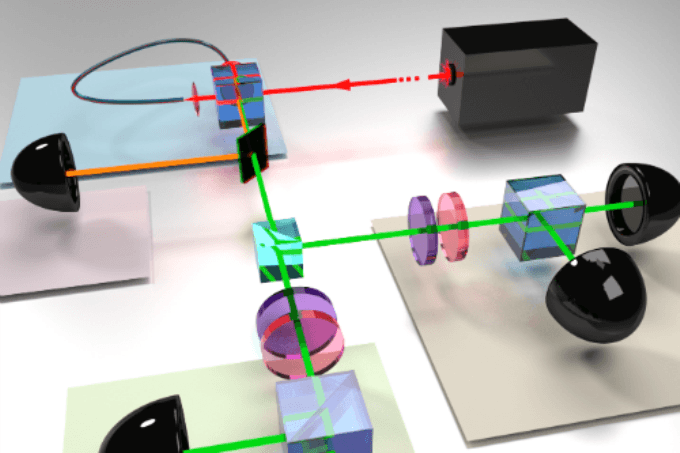Feb 27 2019
The quantum realm is extremely complex, its multiple layers and tiny components eluding regular analytical methodologies.
 Optical realization of the simplest possible technique for simultaneous measurement of two incompatible observables of a single qubit. The measurement strategy here illustrated was applied for probing a fundamental uncertainty relation for simultaneous quantum measurements and is applicable for quantum metrology and other emerging photonic quantum technologies. (Image credit: Adetunmise Dada)
Optical realization of the simplest possible technique for simultaneous measurement of two incompatible observables of a single qubit. The measurement strategy here illustrated was applied for probing a fundamental uncertainty relation for simultaneous quantum measurements and is applicable for quantum metrology and other emerging photonic quantum technologies. (Image credit: Adetunmise Dada)
One of the principles behind a number of the complex quantum occurrences states that there is an intrinsic boundary to the precision with which one can instantly know certain pairs of properties of a quantum system, which are stated as being “complementary”.
For instance, the more precisely the position of a particle is known, the less precisely its speed is known, and vice versa. In actual fact, the more precisely one of such properties is established, the less certain one can be about the corresponding property—knowing the exact answer in one case only increases the challenge of obtaining the full picture.
Obtaining a sight of the complete picture then requires a give and take—trading off precision in the establishment of one property for more precision in that of the other. However, attaining the best possible full picture permissible by the “trade-off” boundaries imposed by laws of quantum physics is an overwhelming task.
Currently, experts at the University of Bristol believe they have discovered a much simpler way to sidestep this challenge. Their research, reported in the journal Optica, could have positive effects on the future of bio-medical science, information security, and other fields of study where revolutionary advances are progressively depending on the ability to integrate and compute the properties of quantum systems.
The solution put forth by scientists from Bristol’s Quantum Engineering Technology Labs involves a specially engineered optical fiber that can produce single photons in a heralded manner, enabling them to compute one photon at a time using a sophisticatedly simple measurement procedure based on an analog of a coin flip. Their experiment concurrently established two complementary polarization properties of a single photon and attained the best possible “full picture” allowed by the trade-off restrictions imposed by laws of quantum physics.
Until we managed it, it was not well known that such quantum-limited simultaneous measurements on a single photon qubit could be realised with a basic setup in such a simple way. Our findings shed light on the limits of how much we can learn about different complementary properties of quantum systems by using practical measurement setups. It is also related to how well we can rely on the information security delivered by quantum protocols in real-world implementations, since the same principles govern the limits on the information that is hackable by an eavesdropper in quantum key distribution.
Dr Adetunmise Dada, Study Lead Author and Senior Research Associate, Quantum Engineering Technology Labs, Bristol University.
Subsequently, the team aim to push the boundaries of quantum understanding even more, by testing whether their approach could be applied to measuring numerous incompatible properties and in large-scale quantum states, executed on a silicon integrated optics platform, which is a promising method to attain multidimensional quantum states encoded in the path degree of freedom of solitary photons.
The Quantum Engineering Technology Labs at the University of Bristol is a leader in achieving such quantum chips using a scalable sophisticated silicon photonics technology.